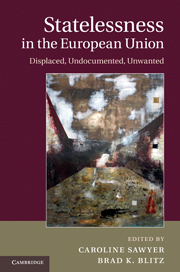Book contents
- Frontmatter
- Contents
- List of contributors
- List of cases
- List of conventions, covenants and treaties
- Acknowledgements
- List of abbreviations and acronyms
- PART I The issue
- 1 Statelessness in the European Union
- 2 Stateless people and undocumented migrants: an Arendtian perspective
- 3 The rights of non-citizens to membership
- 4 Stateless in Europe: legal aspects of de jure and de facto statelessness in the European Union
- 5 Policy responses and global discourses on the rights of non-citizens and stateless people
- PART II The research project
- 12 Conclusions
- Bibliography
- Index
3 - The rights of non-citizens to membership
from PART I - The issue
Published online by Cambridge University Press: 17 February 2011
- Frontmatter
- Contents
- List of contributors
- List of cases
- List of conventions, covenants and treaties
- Acknowledgements
- List of abbreviations and acronyms
- PART I The issue
- 1 Statelessness in the European Union
- 2 Stateless people and undocumented migrants: an Arendtian perspective
- 3 The rights of non-citizens to membership
- 4 Stateless in Europe: legal aspects of de jure and de facto statelessness in the European Union
- 5 Policy responses and global discourses on the rights of non-citizens and stateless people
- PART II The research project
- 12 Conclusions
- Bibliography
- Index
Summary
Introduction
Citizenship in the modern European state is Janus-faced. On the one hand, it is a unifier. It offers a status – a common identity – for integrating residents from varied backgrounds and social situations and even nationalities. In its ideal form, as an egalitarian status, it cuts through barriers of class, status and local identity to offer residents of a territorially defined area a common set of rights, entitlements, privileges and obligations under law that link them to each other and to the state. On the other hand, citizenship is a divider. The status for members it creates is purchased at the price of creating non-members, people excluded from its benefits for reasons of parentage, place of birth, or the possession of another citizenship.
In the contemporary world, the inequalities associated with this exclusive dimension of citizenship weigh heavily. This is partly because globalisation has made it more apparent than ever that the citizenship into which one is born is likely to have a dramatic impact upon the kind of life one will live. If one is lucky enough to be born a citizen of Sweden, the result is first prize in the lottery of life: one can expect to live to seventy-eight years of age and be provided with cradle-to-grave care in a stable and prosperous state.
- Type
- Chapter
- Information
- Statelessness in the European UnionDisplaced, Undocumented, Unwanted, pp. 41 - 68Publisher: Cambridge University PressPrint publication year: 2011
- 18
- Cited by



